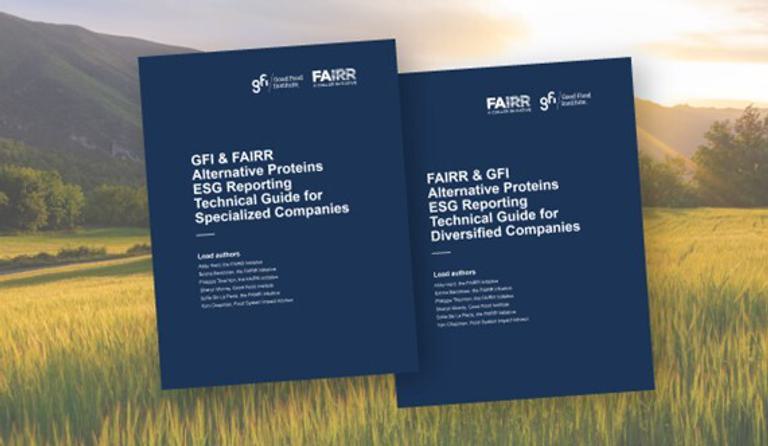New ESG Frameworks Launched to Help Alternative Protein Companies Measure their Sustainability Impacts
• Market Update • Press Release
- Synthesis contributes to first-of-their kind reporting frameworks for alternative meat, seafood, eggs and dairy companies to reveal their climate, biodiversity, nutrition, and other ESG impacts, launched by GFI and FAIRR
- Specialized alternative protein businesses and incumbent food companies are expected to use the new frameworks, as are investors seeking ESG data that highlights the risks and opportunities of alternative proteins compared to conventional protein production
- The new open-source frameworks fill a critical gap in the industry and help address the growing demand from investors and consumers for more in-depth ESG data and transparency
As the alternative protein sector continues to grow, the need to measure ESG credentials of companies in the sector, in order to evaluate the efficacy of these businesses in achieving sustainability and climate goals, is increasingly critical. Synthesis Capital is delighted to have contributed to the development of a new set of ESG reporting frameworks to assess the sustainability impacts of companies in the sector.
The two new reporting frameworks were launched by the Good Food Institute, a non-profit working to accelerate alternative protein innovation, and the FAIRR Initiative, a global investor network representing combined assets of around $70 trillion. A diverse group of investors, corporates and NGOs, including Synthesis, provided input into the development of the frameworks. The ‘Specialised Framework’ has been developed for use by companies solely focused on specialised alternative protein products, whilst the ‘Diversified Framework’ is intended for companies with a diverse range of products. Both frameworks utilise an extensive set of metrics to assess a number of important ESG factors, including emissions, commodity sourcing, land use, nutrition, consumer engagement and labour practices.

The frameworks are important new tools for both start-ups in the alternative protein industry and incumbent food companies to assess and disclose detailed ESG data that is specifically relevant to the sector, and which, over time, should also help these companies to develop and refine long-term sustainability strategies. Importantly for investors, the metrics employed by the frameworks will enable analysis of company performance and impact in a more consistent, effective and comprehensive way. As such, Synthesis will be integrating the frameworks into its existing ESG policies and processes. In addition, whilst it is widely known that alternative proteins have a significantly lower environmental impact than meat-based equivalents, the introduction of the frameworks will enable more direct long-term comparisons, and will thus showcase the crucial role of alternative proteins in decarbonising the food system and mitigating climate change. From a broader perspective, this increased transparency will also allow governments, investors, corporates and consumers to make more informed decisions in the context of rising adoption of alternative protein products.
For more information and to download the full frameworks, please visit https://gfi.org/blog/esg-frame...
